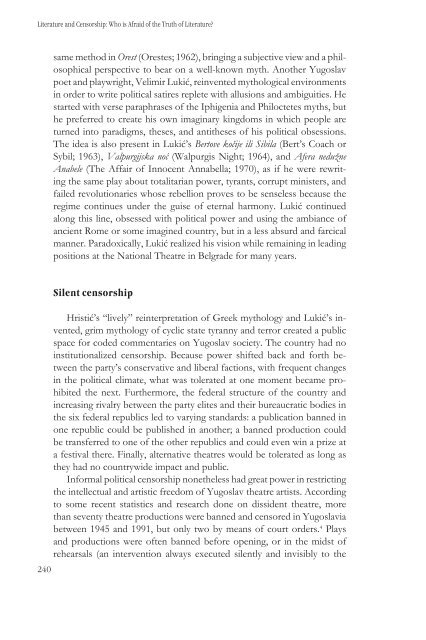Literatura in cenzura - Društvo za primerjalno književnost - ZRC SAZU
Literatura in cenzura - Društvo za primerjalno književnost - ZRC SAZU
Literatura in cenzura - Društvo za primerjalno književnost - ZRC SAZU
- No tags were found...
Create successful ePaper yourself
Turn your PDF publications into a flip-book with our unique Google optimized e-Paper software.
Literature and Censorship: Who is Afraid of the Truth of Literature?same method <strong>in</strong> Orest (Orestes; 1962), br<strong>in</strong>g<strong>in</strong>g a subjective view and a philosophicalperspective to bear on a well-known myth. Another Yugoslavpoet and playwright, Velimir Lukić, re<strong>in</strong>vented mythological environments<strong>in</strong> order to write political satires replete with allusions and ambiguities. Hestarted with verse paraphrases of the Iphigenia and Philoctetes myths, buthe preferred to create his own imag<strong>in</strong>ary k<strong>in</strong>gdoms <strong>in</strong> which people areturned <strong>in</strong>to paradigms, theses, and antitheses of his political obsessions.The idea is also present <strong>in</strong> Lukić’s Bertove kočije ili Sibila (Bert’s Coach orSybil; 1963), Valpurgijska noć (Walpurgis Night; 1964), and Afera nedužneAnabele (The Affair of Innocent Annabella; 1970), as if he were rewrit<strong>in</strong>gthe same play about totalitarian power, tyrants, corrupt m<strong>in</strong>isters, andfailed revolutionaries whose rebellion proves to be senseless because theregime cont<strong>in</strong>ues under the guise of eternal harmony. Lukić cont<strong>in</strong>uedalong this l<strong>in</strong>e, obsessed with political power and us<strong>in</strong>g the ambiance ofancient Rome or some imag<strong>in</strong>ed country, but <strong>in</strong> a less absurd and farcicalmanner. Paradoxically, Lukić realized his vision while rema<strong>in</strong><strong>in</strong>g <strong>in</strong> lead<strong>in</strong>gpositions at the National Theatre <strong>in</strong> Belgrade for many years.240Silent censorshipHristić’s “lively” re<strong>in</strong>terpretation of Greek mythology and Lukić’s <strong>in</strong>vented,grim mythology of cyclic state tyranny and terror created a publicspace for coded commentaries on Yugoslav society. The country had no<strong>in</strong>stitutionalized censorship. Because power shifted back and forth betweenthe party’s conservative and liberal factions, with frequent changes<strong>in</strong> the political climate, what was tolerated at one moment became prohibitedthe next. Furthermore, the federal structure of the country and<strong>in</strong>creas<strong>in</strong>g rivalry between the party elites and their bureaucratic bodies <strong>in</strong>the six federal republics led to vary<strong>in</strong>g standards: a publication banned <strong>in</strong>one republic could be published <strong>in</strong> another; a banned production couldbe transferred to one of the other republics and could even w<strong>in</strong> a prize ata festival there. F<strong>in</strong>ally, alternative theatres would be tolerated as long asthey had no countrywide impact and public.Informal political censorship nonetheless had great power <strong>in</strong> restrict<strong>in</strong>gthe <strong>in</strong>tellectual and artistic freedom of Yugoslav theatre artists. Accord<strong>in</strong>gto some recent statistics and research done on dissident theatre, morethan seventy theatre productions were banned and censored <strong>in</strong> Yugoslaviabetween 1945 and 1991, but only two by means of court orders. 4 Playsand productions were often banned before open<strong>in</strong>g, or <strong>in</strong> the midst ofrehearsals (an <strong>in</strong>tervention always executed silently and <strong>in</strong>visibly to the
















